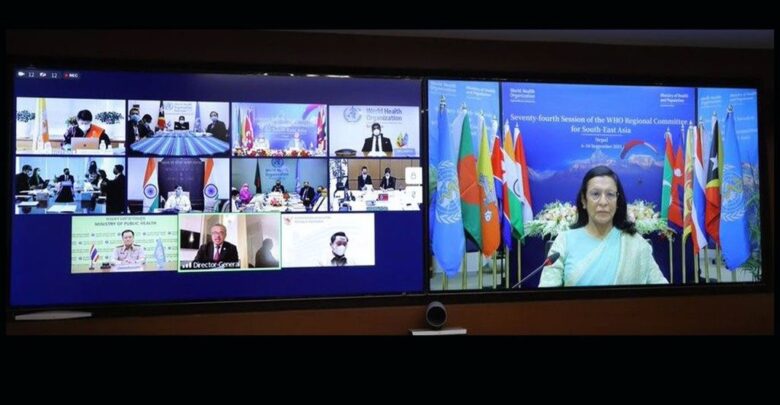

KATHMANDU, Nepal — Taking lessons from the ongoing pandemic and emphasizing a once-in-a-century opportunity, countries of WHO South-East Asia Region adopted a Ministerial Declaration resolving to strengthen health system resilience to ensure health security.
As the five-day Regional Committee meeting of the WHO South-East Asia Region began on Sept. 6, Poonam Khetrapal Singh, regional director of the World Health Organization South-East Asia, emphasized that countries have to rebuild their health systems at a time when government revenues are under pressure.
“Covid-19 has taken a massive toll on our health systems. Services have been disrupted, and health care workers are exhausted,” said Singh.
“Our challenge is multi-faceted, we have to regain lost ground in terms of health outcomes, rebuild health systems that have lost capacity, and we have to do this at a time when government revenues in all countries will be under intense pressure.”
WHO Director-General Tedros Adhanom Ghebreyesus said that he was pleased to see a decline in Covid-19 cases and deaths in the South-East Asia region.
“The Covid-19 pandemic continues to take a heavy toll on lives, livelihoods, societies, and economies,” Ghebreyesus said in a statement.
“I am pleased to see a decline in cases and deaths in the South-East Asia region, following the devastating surge in May of this year.”
“However, the situation varies widely from country to country and place to place, with steep increases and overwhelmed hospitals in some areas. We must never again allow a pandemic on this scale. And that we must never again allow an injustice on this scale,” he said.
The Prime Minister of Nepal, Sher Bahadur Deuba, while inaugurating the annual governing body meeting of WHO in the Region said the session convened to take important decisions on health status.
“This Session is convened to take important decisions on improving the health status of the people in this region at a time our health systems are overstretched to cater essential health services to the needy people.”
“Let’s ensure equitable access to vaccines, medicines, tools, and technologies for the sake of humanity.”
“Reaching out to the unreached should be our priority,” said Deuba.
The five-day virtual session was attended by Health Ministers and senior health officials of the Region’s Member Countries, UN Agencies, partners, donors, and civil society representatives.
They will deliberate on strengthening public health emergency preparedness and response and accelerating progress to prevent and control non-communicable diseases, among other health issues.
Meanwhile, Indian Union Health Minister Mansukh Mandaviya, on Sept. 6, had an informal meeting with Ghebreyesus and other officials on the second day of the G20 Health Ministers’ meeting.
Taking to Twitter, Mandaviya said that he had an informal meeting with WHO Director-General Tedros Adhanom Ghebreyesus, Organisation for Economic Co-operation & Development (OECD) Global Health Advisor Nick Tomlinson, and OECD Director for Employment, Labour & Social Affairs Stefano Scarpetta.
“Had an informal meeting with @DrTedros, Director-General @WHO, Nick Tomlinson, Global Health Advisor, @OECD and Stefano Scarpetta, Director for Employment, Labour and Social Affairs, OECD on the 2nd day of the G20 Health Ministers’ meeting,” Mandaviya tweeted.
“Our dialogue pertained to matters of global health importance. This was in addition to India’s interventions in the 2nd and 3rd sessions of ministerial discussion,” he said.
On Sept. 5, Mandaviya participated in the G-20 Health Ministers Meeting 2021 hosted by the Italian Presidency on the theme “People, Planet & Prosperity.”
Mandaviya, who is in Rome for the meeting, also “shared India’s response to monitor Global Health Impact of Covid-19 pandemic, with a detailed assessment of its consequences in implementing Sustainable Development Goals,” the Minister said.
Mandaviya also interacted with his Brazilian counterpart Marcelo Queiroga to strengthen Indo-Brazil ties in the healthcare sector.
“We spoke about One Health & the introduction of Nano-Urea for better results. Also, offered India’s full support to aid Brazil’s fight against TB,” Mandaviya informed in his tweet.
Nano Urea Liquid is a Sustainable Solution for Plant Nutrition with higher Nutrient Use Efficiency and reducing soil, water, and air pollution.
(With inputs from ANI)
Edited by Amrita Das and Pallavi Mehra
The post Countries Have To Rebuild Health Systems: WHO South-East Asia Regional Director appeared first on Zenger News.





